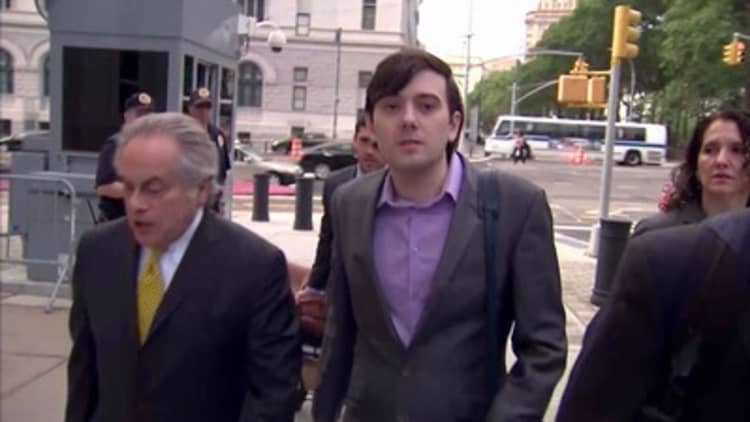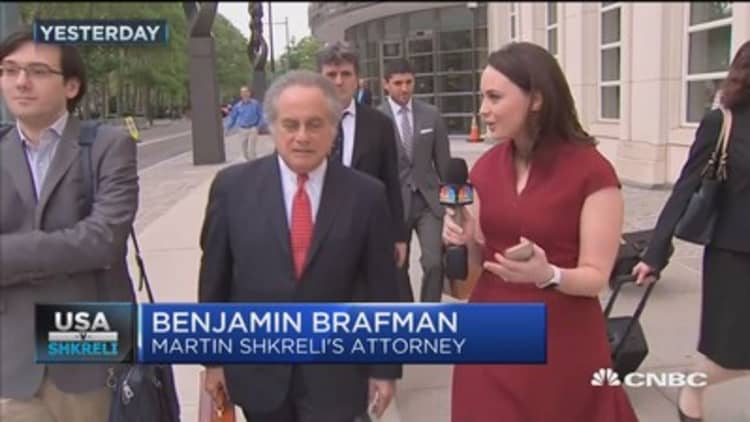
The daughter of a well-known pharmaceuticals executive testified Thursday she felt "betrayed" by Martin Shkreli after the "pharma bro" dragged his feet for months in paying out her supposedly profitable hedge fund investment — only to tell her the money had been used without her permission to capitalize his new drug company.
"I was upset. I saw that as being my cash," testified Sarah Hassan about learning from Shkreli in early 2013 that there was no money left in his hedge fund MSMB Capital after his decision to close it.
"To be frank, I felt somewhat betrayed at this point," Hassan, 27, told jurors in Brooklyn, New York, federal court. "I was told I could get my cash from the fund months ago."
"It just wasn't right," said Hassan, who was the first witness to testify in Shkreli's criminal trial on charges of securities fraud.
Hassan said that when Shkreli, 34, had told investors he was closing the fund, he offered to pay out all of their investments either in cash, in stock of his new drug company Retrophin, or a combination of both.
She eventually, almost a year later, ended up getting her principal investment, and then some, along with a bunch of Retrophin stock that resulted in a steep profit.
Hassan may have been very fortunate to do so.
She testified that in January 2011, shortly before he invested $300,000 of her own money in MSMB Capital, Shkreli during a dinner in Manhattan told her the hedge fund had between $40 million and $50 million under management.
In fact, prosecutors have said in an indictment, two months before that MSMB Capital had just $700 on hand, as a result of Shkreli's ongoing trading losses.
Hassan also testified that several times she felt compelled to tell Shkreli not to publicly suggest, falsely, that her dad Fred Hassan was either an investor with Shkreli or an advisor to his then-start-up Retrophin.
Fred Hassan was CEO and chairman of Schering-Plough before it merged with Merck in 2009, and was chairman of Bausch & Lomb for three years after that. He now is a managing director at the private equities investment firm Warburg Pincus.
His daughter said she was surprised, several times, to see her father mentioned as a consultant to Retrophin in news articles. She also was "quite surprised" to see her father's email address was among the addresses in a group email that broke down how much people had invested in Retrophin, "because he certainly wasn't an investor."
Sarah Hassan said she first invested $300,000 with Shkreli's hedge fund after meeting him through a colleague of her father, former Bausch & Lomb CEO Brent Saunders. She testified that Saunders had told her Shkreli was "a rising star in the hedge fund world."
Her investment amount represented about 30 percent of her personal net worth of $1 million, she said, and she made the investment because he was interested in developing a business relationship with Shkreli.
When she made that investment, Hassan said, she was told she could get her money out of the fund on one month's notice. She also said she was told that MSMB Capital invested in a "mix" of equities, and did not as a rule hold more than 5 percent of its assets under management in a single equity position.
Hassan said she was "ecstatic" over the months to receive emailed statements showing a solid profit for her money.
Her first statement from Shkreli, emailed on March 2, 2011, claimed that MSMB Capital had earned a return of 4.24 percent on its stock positions in the prior month, the first full month she had her money in the fund.
But in reality, prosecutors say, Shkreli blew effectively all of MSMB Capital's assets in a disastrous short position he took on Orexigen Therapeutics shares, which left the fund with with a $7 million debt to Merrill Lynch
However, by the end of 2011, Hassan testified, Shkreli had told her the investment had grown to more than $365,000.
That had purportedly grown to more than $435,000 by mid-2012, Hassan testified, reading from an email she received updating her on her investment.
Hassan said she did become curious as to why those statements showing her investment returns, which had previously been emailed every month or so, over time became more sporadic.
However, "I was thrilled" to learn her stake had increase so much, she said.
"It was a very significant return. This was the single biggest investment I had, so to see it as the best performing [one] was exciting."
Hassan said she was "surprised" to hear in late 2012 that Shkreli planned to wind down MSMB to focus on a different investment strategy.
She noted that Shkreli claimed the fund had an almost 80 percent return on assets under management since it was started in 2009, well outpacing the benchmark S&P 500 stock index. She said it would be unusual for a hedge fund to close when it was doing so well.
Hassan described her frustration over how Shkreli for months dragged his feet in disbursing what she had been told was then more than $435,000 in funds at MSMB, net of fees, by the time Shkreli told her he was closing the hedge fund. That represented a return of more than 45 percent on her original investment.
Hassan said that after months of asking him about the money, Shkreli told her the money had been used to fund Retrophin, his new drug company.
"I would like you to tell me would like you to tell me why you are refusing to return my calls," Hassan wrote Shkreli in one email. "I asked for my funds to be returned to me fully in cash."
It was only after almost a year of being told of MSMB's wind-down that she managed to get $400,000 in cash paid to her by Retrophin — not Shkreli —,and more than 58,000 shares of Retrophin stock.
But that came only after she agreed to sign a settlement agreement and promised not to sue for over the situation.
She later sold those shares for $900,000, she testified.
And her family's hedge fund, Dynagrow, which she manages, itself realized a profit of almost $1.3 million after selling Retrophin shares it had acquired as a result of a $125,000 initial investment by that fund, Hassan testified.
Prosecutors have argued that Hassan and other investors were unaware of the fact that Shkreli, contrary to the glowing financial statements he sent them, was losing money at MSMB Capital, and then another hedge fund he started, MSMB Healthcare.
They allege he looted millions of dollars from Retrophin to repay the investors he had defrauded at his hedge funds.
When asked by a prosecutor whether she had had any contact with Shkreli since finally receiving her a pay-out for her hedge fund investment with him, Hassan said, "Not really."
She also said she had never invested with him again.
Asked why, Hassan said, "I have a very troubling experience in the past, so it's not something I would choose to opt in on again in the future."
During an aggressive cross-examination of Hassan, Shkreli's lawyer Benjamin Brafman underscored the fact that she had eventually gotten well more than her original investment back, and that Retrophin became a successful company.
"At the end of the day you made a hefty profit?" Brafman asked.
Hassan said, "Yes, even more than I asked for."
Watch: Pharma Bro Shkreli finally gets jury



